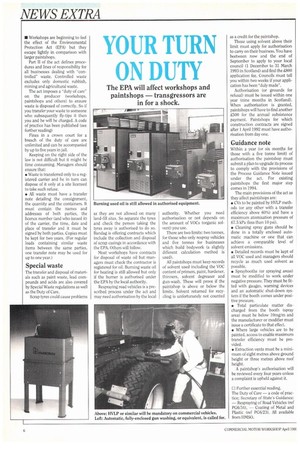YOUR TURN ON DUTY
Page 94

If you've noticed an error in this article please click here to report it so we can fix it.
III Workshops are beginning to feel the effect of the Environmental Protection Act (EPA) but they escape lightly in comparison with larger paintshops.
Part H of the act defines procedures and lines of responsibility for all businesses dealing with "controlled" waste. Controlled waste excludes only domestic rubbish, mining and agricultural waste.
The act imposes a "duty of care" on the producer (workshops, paintshops and others) to ensure waste is disposed of correctly. So if you transfer your waste to someone who subsequently fly-tips it then you and he will be charged. A code of practice has been published (see further reading) Fines in a crown court for a breach of the duty of care are unlimited and can be accompanied by up to five years in jail.
Keeping on the right side of the law is not difficult but it might be time consuming. Managers should ensure that: • Waste is transferred only to a registered carrier and he in turn can dispose of it only at a site licensed to lake such refuse.
• All waste must have a transfer note detailing the consignment, the quantity and the containers. It must contain the names and addresses of both parties, the licence number (and who issued it) of the carrier, the time, dale and place of transfer and it must be signed by both parties. Copies must he kept for two years. (For regular loads containing similar waste items between the same parties, one transfer note may be used for up to one year.)
Special waste
The transfer and disposal of materials such as paint waste, lead compounds and acids are also covered by Special Waste regulations as well as the Duty of Care.
Scrap tyres could cause problems as they are not allowed on many land-fill sites. So separate the tyres and check the person taking the tyres away is authorised to do so. Bandag is offering contracts which include the collection and disposal of scrap casings in accordance with the EPA. Others will follow.
Most workshops have contracts for disposal of waste oil but managers must check the contractor is registered for oil. Burning waste oil for heating is still allowed but only if the burner is authorised under the EPA by the local authority.
Respraying road vehicles is a prescribed process under the act and may need authorisation by the local authority. Whether you need authorisation or not depends on the amount of VOCs (organic solvent) you use.
There are two limits: two tonnes, for those who only respray vehicles and five tonnes for businesses which build bodywork (a slightly different calculation method is used).
All paintshops must keep records of solvent used including the VOC content of primers, paint, hardener, thinners, solvent degreaser and gun-wash. These will prove if the paintshop is above or below the limits. Solvent returned for recycling is unfortunately not counted as a credit for the paintshop.
Those using solvent above their limit must apply for authorisation to carry on their business. You have beetween now and the end of September to apply to your local council (1 December lo 31 March 1993 in Scotland) and find the £800 application fee. Councils must tell you within two weeks if your application has been "duly made".
Authorisation (or grounds for refusal) must be issued within one year (nine months in Scotland). When authorisation is granted, paintshops will have to find another £500 for the annual subsistence payment. Paintshops for which construction contracts are signed after 1 April 1992 must have authorisation from day one.
Guidance note
Within a year (or six months for those with a five tonne limit) of authorisation the paintshop must submit a plan to upgrade its process to comply with the provisions of the Process Guidance Note issued under the act. For existing paintshops the first major step comes in 1994.
The main provisions of the act as they affect paintshops are: • CVs to be painted by HVLP methods (or any other with a transfer efficiency above 60%) and have a maximum atomisation pressure of 67.5 kPa (less than 10 psi).
• Cleaning spray guns should be done in a totally enclosed automatic machine or one that can achieve a comparable level of solvent emissions.
• Detailed records must be kept of all VOC used and managers should recycle as much used solvent as possible.
• Spraybooths (or spraying areas) must be modified to work under negative pressure. They must be fitted with gauges, warning devices and an automatic shut-down system if the booth comes under positive pressure.
• Total particulate matter discharged from the booth (spray area) must be below 10mg/m and the manufacturer or modifier must issue a certificate to that effect.
• Where large vehicles are to be painted, access to enable maximum transfer efficiency must be provided.
• Extraction vents must be a minimum of eight metres above ground height or three metres above roof height.
A paintshop's authorisation will be reviewed every four years unless a complaint is upheld against it.
















































































































